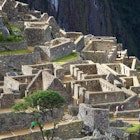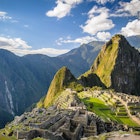
Jan 21, 2020 • 4 min read
Dec 11, 2020 • 2 min read

The project aims to make significant changes over the coming decades © Daniel Neukirch / 500px
Countless people around the world are taking special efforts as of late to make travel more sustainable. Peru is the latest example of this, with the country not only launching a brand new sustainable travel brochure that celebrates local wildlife and nature, but announcing an initiative that aims to make Machu Picchu completely carbon neutral in the coming years.
The iconic site reopened to tourists back in November with a special ceremony that celebrated the unique culture of the country. Shortly after that the Machu Picchu Carbon Neutral initiative was announced, a project that seeks to make Machu Picchu the first tourist destination in Peru and the world to drastically reduce carbon dioxide emissions. A study will be the starting point for making strategic decisions so that the carbon footprint of Machu Picchu can be progressively reduced, with the goal of 45% reduction in emissions by 2030 and 100% by 2050, following the guidelines of the climate agreement of Paris.

The project will seek public and private investment, prioritizing activities that have a positive impact on the site and on the environment. Aims include the expansion of organic waste treatment and the reduction of plastic in Machu Picchu.
“Machu Picchu Carbon Neutral is a source of pride and commitment of the local population in general and of young people in particular who will have the opportunity to learn more about climate change and the mitigation measures that are implemented to make Machu Picchu healthy and sustainable,” a representative of Peru Travel told Lonely Planet. The project has also put forward the idea to promote activities that include tourists offsetting their own carbon emissions.
The new sustainable travel brochure covers experiences throughout the country, telling the story of Peru’s landscapes and people. Today, more than 17% of the land is protected, with 76 natural protected areas, 21 regional conservation areas and 134 private conservation areas with the country’s borders. It has made the country a popular choice for travellers looking for sustainable experiences.
The 100-day Arctic journey to educate people on climate change
See how climate change is endangering landmarks around the world
Take a peek inside Ikea's first sustainable tiny home

Photography
He launched the #vanlife frenzy - now he's swapped it for an off-grid cabinNov 5, 2020 • 8 min read

Jan 21, 2020 • 4 min read

Nov 1, 2019 • 3 min read


Jun 28, 2019 • 5 min read

May 16, 2019 • 3 min read


Jan 21, 2018 • 6 min read

